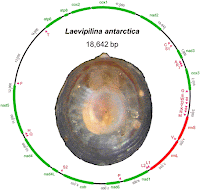Scientists aren't always sure
 |
| Mitochondrial genome of a monoplacophoran (from Stöger et al. 2016) |
Well, that's not true. There's always room for uncertainty. That's how science works. That's how it advances. There are always questions we don't have answers to, and there is always a possibility that even the most cherished theories will be overturned as new evidence comes to light. If things were completely settled, science would just stop, but it's not stopping. It keeps moving forward.
Take the great Tree of Life, the evolutionary family tree that supposedly connects all organisms on earth. A new paper in BMC Evolutionary Biology details efforts to fill in part of that evolutionary tree for a small group of mollusks called monoplacophorans. They kind of look like a clam with only one shell (see the picture above). The researchers sequenced mitochondrial DNA of three species of monoplacophorans, which usually should be enough to figure out where they go on the evolutionary tree, but it didn't work this time. The researchers couldn't say conclusively where the monoplacophorans should go.
Now this does not mean that all of evolution is bogus or that scientists don't know what they're talking about. That's crazy. Creationists have very similar difficulties sorting out created kinds (which we'll talk about next week), so we have no room to point accusing fingers. We all just keep working at research until solutions to our questions become clear. This monoplacophoran study reminds us that all scientists, regardless of what they think about evolution and creation, have difficulties and uncertainties that come with being scientists. What we think we know today might turn out to be wrong tomorrow. We would all be very wise to show a little humility in our presentations of science, even if it's as "certain" as evolution.
Stöger et al. 2016. Monoplacophoran mitochondrial genomes: convergent gene arrangements and little phylogenetic signal. BMC Evol Biol 16:274.
Feedback? Email me at toddcharleswood [at] gmail [dot] com. If you enjoyed this article, please consider a contribution to Core Academy of Science. Thank you.